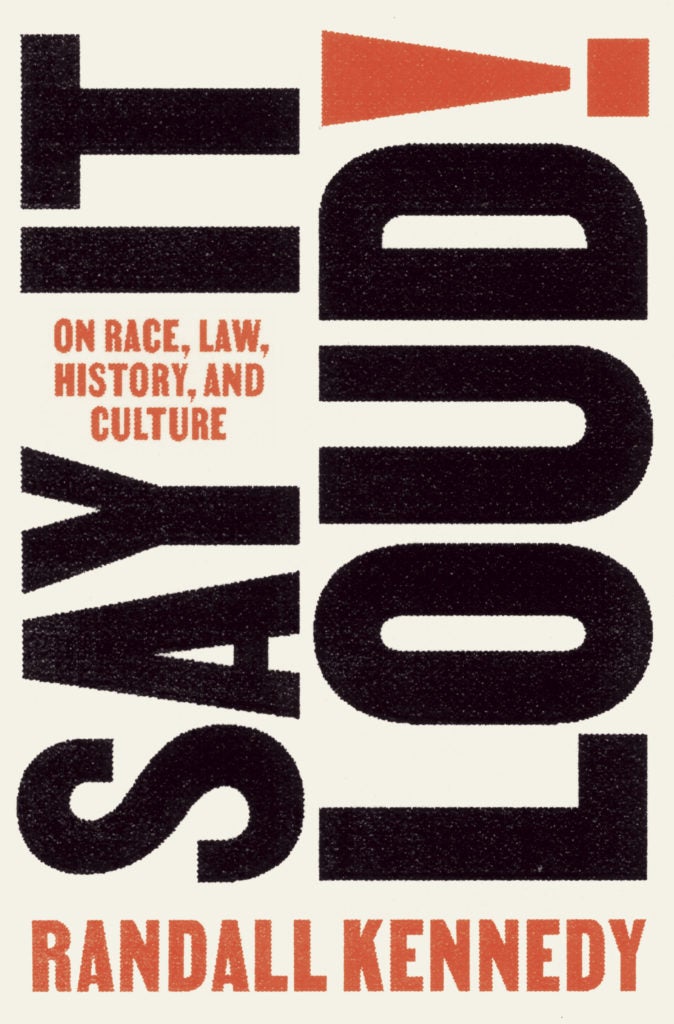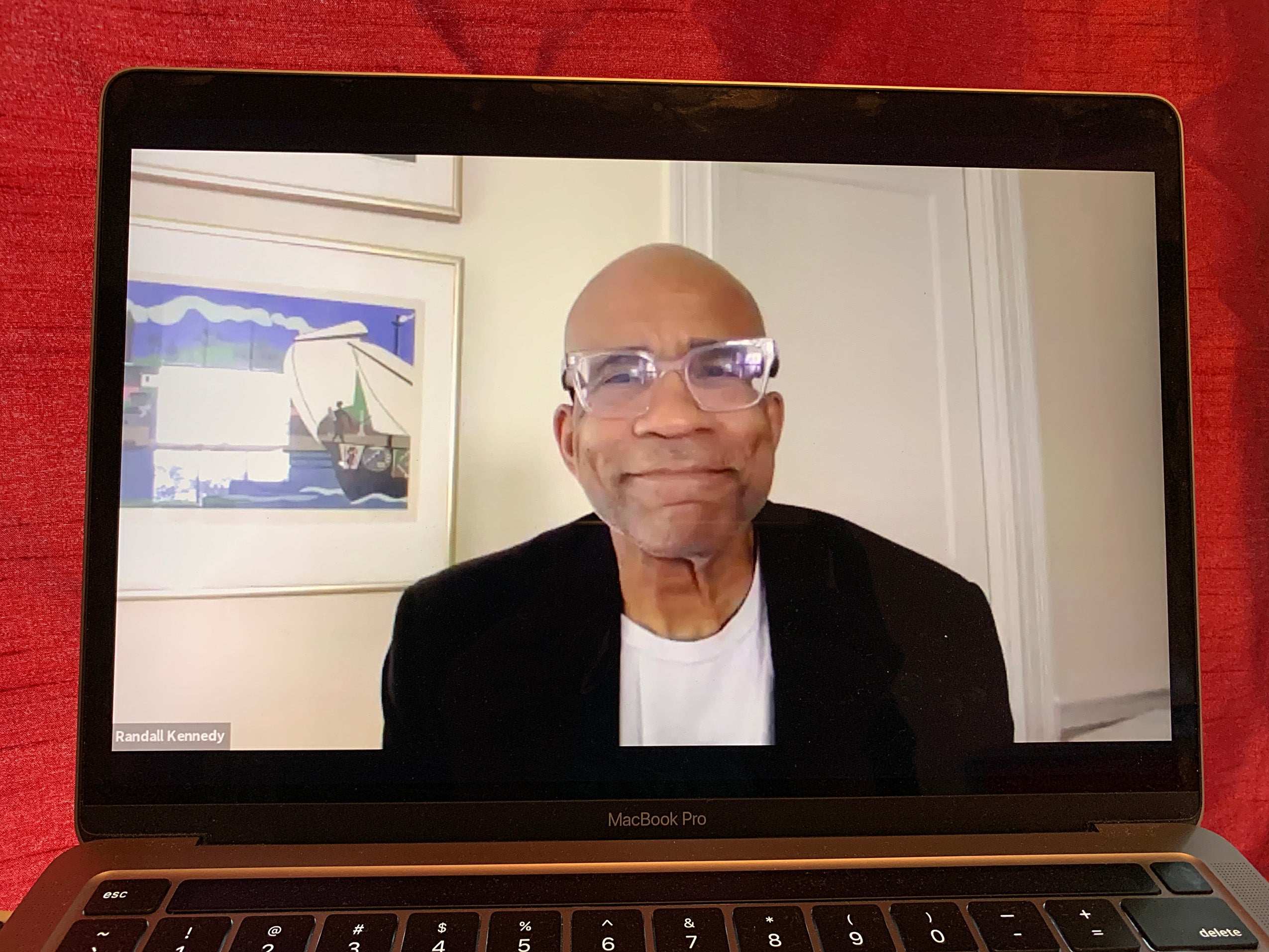“I’m extremely critical of the recent attack on critical race theory, because it’s not just an attack on critical race theory — it’s an attack on critical thinking; it’s an attack on thought itself,” said Randall Kennedy, Michael R. Klein Professor of Law, at a Harvard Law School Library Faculty Book Talk last week.
During a wide-ranging discussion about his new collection of essays, “Say it Loud! On Race, Law, History, and Culture,” followed by a question and answer session, Kennedy shared background on a few of his favorite pieces, defended free thought, and spoke about his view on the future of race relations in America.

On critical race theory itself, Kennedy said he had mixed feelings — but also ardently defended its inclusion in the national conversation. “I think that one ought to protect expression, protect speech, protect thinking, even when one is very critical of that thinking,” he said. “I’ve been very critical of certain aspects of critical race theory and remain rather critical of certain aspects of critical race theory. But I certainly think that people should read it.”
Kennedy added that he agreed with two central ideas of critical race theory, namely that racism has been a pervasive issue throughout the country’s history, and that conventional anti-discrimination laws have been inadequate to create a fully just and equal society.
Yet, he added, Derrick Bell, the former Harvard Law professor and pioneer of critical race theory, “took the position late in his career that there had really been no appreciable change in the status of African Americans over the course of the past century. Well, it seems to me that that’s just untenable. … It’s tenable for somebody to say that there has been far less change than one would have wanted. But no change? Well, what does one do about Barack Obama being president of the United States for eight years? Or for that matter, what does one do about the current vice president, [or] the current head of the Defense Department?”
“I think that one ought to protect expression, protect speech, protect thinking, even when one is very critical of that thinking.”
In response to a follow-up question by an audience member suggesting such rhetoric was intended to bring attention to the cause rather than to be strictly accurate, Kennedy agreed in part. “There’s nothing wrong with a little sensationalism,” he said. “But after you’ve gotten the reader’s attention … then it seems it’s a problem if one gets stubborn, and if one simply denies counter ideas that one should have to face, and explain, and grapple with.”
Kennedy hinted that that notion — that Americans must not simply tolerate, but confront and contend with, ideas other than our own — is a theme in his book. He said some of the essays in his book had been published before — in places like The New York Times, Harper’s Magazine, the London Review, and the Atlantic — but that they have been updated to reflect the evolution of his own thinking.
In one piece, said Kennedy, he takes a fresh look at his long and complicated friendship — close at some points, yet “vexed [at] others,” as he put it — with Derrick Bell, who was the first Black tenured professor at HLS.
“[Bell] urged me not to publish a piece [criticizing certain aspects of critical race theory], because he thought that enemies of critical race theory would use it as a cudgel to attack that movement,” he said. “Well, I did publish the piece, and that angered him very much,” leading the two to become more distant.
In writing his essay, in which he reconsiders Bell’s views and their relationship, Kennedy read through Bell’s papers at New York University Library, and “left having a higher opinion of him now than I did back then,” said Kennedy. “I’m sorry that I didn’t give him his due back then. I tried to give him his due in this essay.”
Other pieces in his book, said Kennedy, were inspired by debates he had encountered in his life — or in the classroom. Once, while teaching, he used the word “Negro” to refer to Black Americans, which prompted pushback from a student.
“Black American culture is complex and wide and riven. … I would hope that people would study enough to know that and to act accordingly.”
After consideration, Kennedy decided, “My bottom line is if ‘Negro’ was good enough for Thurgood Marshall, if ‘Negro’ was good enough for Martin Luther King, Jr., if ‘Negro’ was good enough for W. E. B. Dubois, if ‘Negro’ was good enough for Medgar Evers, if ‘Negro’ was good enough for Rosa Parks and Fannie Lou Hamer – it’s good enough for me.”
The disagreement illustrates another of Kennedy’s points: that Black America is not a monolith. “Black Americans have all sorts of thoughts, some good, some bad. There are all sorts of tensions … all sorts of conflict within Black America,” he said. “Black American culture is complex and wide and riven. … I would hope that people would study enough to know that and to act accordingly.”
When an audience member queried how Kennedy viewed the future of race relations in the U.S., he admitted that his previous optimism had been undoubtedly tempered by the election of Donald Trump in 2016.
Yet, he said, “Across American life, one sees the continuation of progress toward greater racial decency in America. … You see Blacks and other people of color coming to the fore, in all sorts of different forums, all sorts of different sectors of American life. You see all sorts of people who attack racism, repudiate racism, passionately. Think about what happened in the aftermath of George Floyd’s murder.”
“There is reason to be disturbed, there is reason to be on guard,” Kennedy added, but “there is reason … to remain hopeful about the future. And that’s where I am.”
